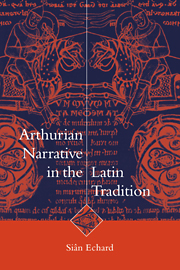Book contents
- Frontmatter
- Contents
- Acknowledgments
- Note on translations
- Introduction: Latin Arthurian narrative and the Angevin court
- 1 “The Anger of Saturn shall fall”: Geoffrey of Monmouth's Historia regum Britannie and the limits of history
- 2 “This is that Arthur”: chronicle responses to Arthur
- 3 “Are you the only uncivilized knight produced by sweet Britain?”: Arthurian episodes and knightly conduct
- 4 “Understanding the thing as it is”: De Ortu Waluuanii and the challenge of interpretation
- 5 “Dies fantastica”: the Historia Meriadoci and the adventure of the text
- 6 “When I have done you will be little the wiser”: Arthur and Gorlagon, Vita Merlini, and parody
- Conclusion: “A wise man may enjoy leisure”: The place of Latin Arthurian literature
- List of works cited
- Index
- CAMBRIDGE STUDIES IN MEDIEVAL LITERATURE
1 - “The Anger of Saturn shall fall”: Geoffrey of Monmouth's Historia regum Britannie and the limits of history
Published online by Cambridge University Press: 10 November 2010
- Frontmatter
- Contents
- Acknowledgments
- Note on translations
- Introduction: Latin Arthurian narrative and the Angevin court
- 1 “The Anger of Saturn shall fall”: Geoffrey of Monmouth's Historia regum Britannie and the limits of history
- 2 “This is that Arthur”: chronicle responses to Arthur
- 3 “Are you the only uncivilized knight produced by sweet Britain?”: Arthurian episodes and knightly conduct
- 4 “Understanding the thing as it is”: De Ortu Waluuanii and the challenge of interpretation
- 5 “Dies fantastica”: the Historia Meriadoci and the adventure of the text
- 6 “When I have done you will be little the wiser”: Arthur and Gorlagon, Vita Merlini, and parody
- Conclusion: “A wise man may enjoy leisure”: The place of Latin Arthurian literature
- List of works cited
- Index
- CAMBRIDGE STUDIES IN MEDIEVAL LITERATURE
Summary
The first text to be examined here is in some ways atypical of the works in this study. Unlike the largely unknown and uninfluential works in the chapters to follow, Geoffrey of Monmouth's Historia regum Britannie was one of the most widely read of medieval Arthurian texts. I have chosen to begin with it, then, because its familiarity to medieval and modern audiences alike helps to prepare the way for the discussion of those characteristics which it shares with the other works to be discussed later. The Historia is arguably the most influential product of British Latin writing in the twelfth century. Its author is a magister who was part of the circle of some of the most important men of his day, one who ended his life with the title, if not the possession, of a bishopric, suggesting the sort of recognition to which such educated clerical writers aspired. Most important from my perspective is the posterity of the Historia. The arguments about the literary and historical values of the work which began almost immediately after its appearance and which continue to this day, provide a dramatic example of the delight and perplexity provoked by many of the works in this study.
Part of the problem in discussing Geoffrey's Historia lies in the generic terms available to us for that purpose.
- Type
- Chapter
- Information
- Arthurian Narrative in the Latin Tradition , pp. 31 - 67Publisher: Cambridge University PressPrint publication year: 1998



